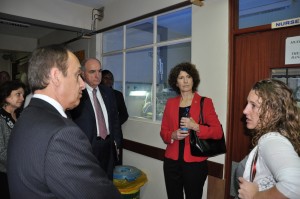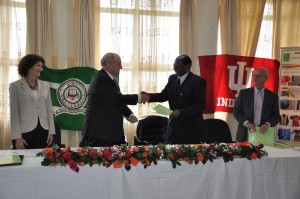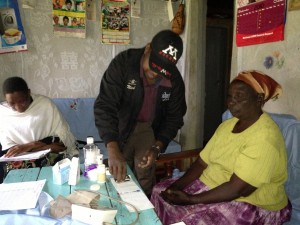Goodbye, Kenya. Greetings, Ghana.
Members of the IU delegation said goodbye to Kenya early this morning, but not without taking with them an indelible impression of a country that, in many ways, reflects both the dynamism and tension felt here in Africa, the world’s second-largest and second-most-populous continent, but also its poorest and most underdeveloped.

IU delegation members speak with a faculty member outside a new neonatal nursery at the AMPATH Center in Eldoret, Kenya.
About half of those who live in sub-Saharan Africa are living in poverty, and the average poor person makes less than $1 a day. When you consider the massive health care challenges facing the region, including widespread HIV/AIDS, the situation in Africa seems staggeringly dire.
That said, there was great reason for hope in Eldoret, Kenya, where the historic AMPATH project has become one of the largest academic centers for the treatment of HIV/AIDS in the world since its founding more than two decades ago. Following a “lead with care” model championed by its co-founders, doctors Joe Mamlin and Bob Einterz, AMPATH has, in recent years, broadened its scope and mission to include other areas critical to Kenyans’ survival, including food and income security and non-communicable chronic diseases such as heart disease, hypertension, diabetes and cancer, that pose a health threat projected to far exceed that of HIV in sub-Saharan Africa.
There is no denying the great despair at the AMPATH Center/Moi Teaching and Referral Hospital, which IU President Michael A. McRobbie, the first IU president to ever visit the program, had the opportunity to tour earlier this week. The images — of crowded medical wards, sad faces, children exposed to and possibly infected with HIV, and bottles of medications stacked in a pyramid-shaped pile 10 rows high — won’t be soon forgotten.
But neither will the pride that members of the IU delegation felt after meeting and talking with the many IU faculty and students in Eldoret who are having a dramatic impact in saving Kenyans lives. To hear directly from them — and from their Kenyan colleagues at Moi University — about what the AMPATH project has meant to them, and to experience, first-hand, a program that now serves 3.5 million people in over 500 urban and rural clinical sites throughout western Kenya is incredibly emotional and uplifting.
Indeed, it’s impossible not to admire the amazing progress taking place at AMPATH, through the marvelous dedication of its faculty and staff, which is reflected in a new state-of-the-art neonatal area; a child-life center that warmly caters to sick and orphaned children; new safety-net interventions and vulnerability assessments and an oncology department that started from next to nothing and will soon be housed in a new Chronic Disease Building, which will open in 2015. Equally impressive is the work AMPATH staff are doing to reach people, some of whom have never received any type of medical care, in small, rural villages in the outer reaches of Eldoret — villages such as Mosoriot, where delegation members were welcomed into an elderly woman’s home and watched, along with her daughters and two young grandchildren, as a young Swahili-speaking counselor administered a diabetes and HIV test. The test, thankfully, was negative, so delegation members and their newfound friend celebrated over tea, a kind of sour milk and grilled maize.
It was also fascinating to hear about work being done to improve and expand AMPATH’s Open Medical Record System, which was designed to confront one of the most vexing challenges of health care systems in Africa: the transition of outdated paper-based registries into electronic medical records responsive to the needs of patients, providers, donors and government. AMPATH physicians and informational technology staff are working together to realize the promise of a large-scale electronic medical records system for Kenya, where electricity has become more widely distributed, Internet access is available and the majority of the country’s citizens now have cell phones. If they are successful (no easy feat), an expanded OpenMRS could potentially revolutionize the way health care is conducted in Africa and around the world.

IU President Michael A. McRobbie shakes hands with Moi University Vice Chancellor Richard Kiprono Mibey after signing a new partnership agreement between their respective universities.
And then there was the signing of a new partnership agreement with Moi University, which McRobbie said will “elevate” IU’s relationship with Moi to the university level and ensure expanded collaboration in academic disciplines across both universities — including in areas such as dentistry, nursing and medicine, which Moi leaders say they would not have been able to launch without the help of IU colleagues; but also in newer areas such as mass media, a rapidly growing industry in Kenya. As a graduate of the IU School of Journalism, I took great personal pride in IU formalizing an agreement with Moi’s Department of Communications, an agreement built on the foundation set by a successful exchange program where IU journalism students work side by side with their Moi counterparts and report on, among other topics, the great work being done at AMPATH.
So now it’s on to our final stop, Accra, Ghana, where members of the delegation will meet with IU alums here, site of the university’s first-ever study abroad program, and explore new collaborations with leaders at the University of Ghana, the country’s oldest university. It’s sure to be an educational last leg of this most productive and inspiring presidential trip.
Tags: Africa, AMPATH, Eldoret, Ghana, IU School of Journalism, Kenya, Michael McRobbie, Moi Teaching and Referral Hospital, Moi University, Mosoriot, Richard Kiprono Mibey, University of Ghana


